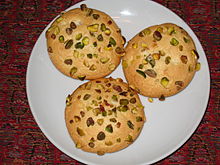Ghurayba

Qurabiya of Tabriz
|
|
| Type | Shortbread |
|---|---|
| Place of origin |
|
| Region or state | Iranian Azerbaijan |
| Main ingredients | Almond flour, sugar, egg white, vanilla |
| Variations | Kourabiedes, mantecado, polvorón, pan de polvo |
| Similar dishes | |
| |
|
Qurabiya (Azerbaijani: قورابیه Qurabiyə, Turkish: Kurabiye, Arabic: غرّيبة, Albanian: Kurabie, Bosnian Gurabija, Greek: κουραμπιές, Bulgarian: курабия, Persian: قرابیه), is a shortbread-type biscuit originating from Iran, usually made with ground almonds.
Cookies appear to have their origins in 7th century Persia, modern day Iran, shortly after the use of sugar became relatively common in the region.
Kurabiye appears in the Ottoman cuisine in the 15th century and the word's origin may be Turkish (p. 259 of the source).
In Tabriz, they are made of almond flour, sugar, egg white, vanilla, margarine and pistachio. It is served with tea, customarily placed on top of the teacup to make it soft before eating.
Kourabiedes or kourabiethes (Greek: κουραμπιέδες) resemble a light shortbread, typically made with almonds. Kourabiedes are sometimes made with brandy, usually Metaxa, for flavouring, though vanilla, mastika or rose water are also popular. In some regions of Greece, Christmas kourabiedes are adorned with a single whole spice clove embedded in each biscuit. Kourabiedes are shaped either into crescents or balls, then baked till slightly golden. They are usually rolled in icing sugar while still hot, forming a rich butter-sugar coating. Kourabiedes are especially popular for special occasions, such as Christmas or baptisms.
...
Wikipedia
